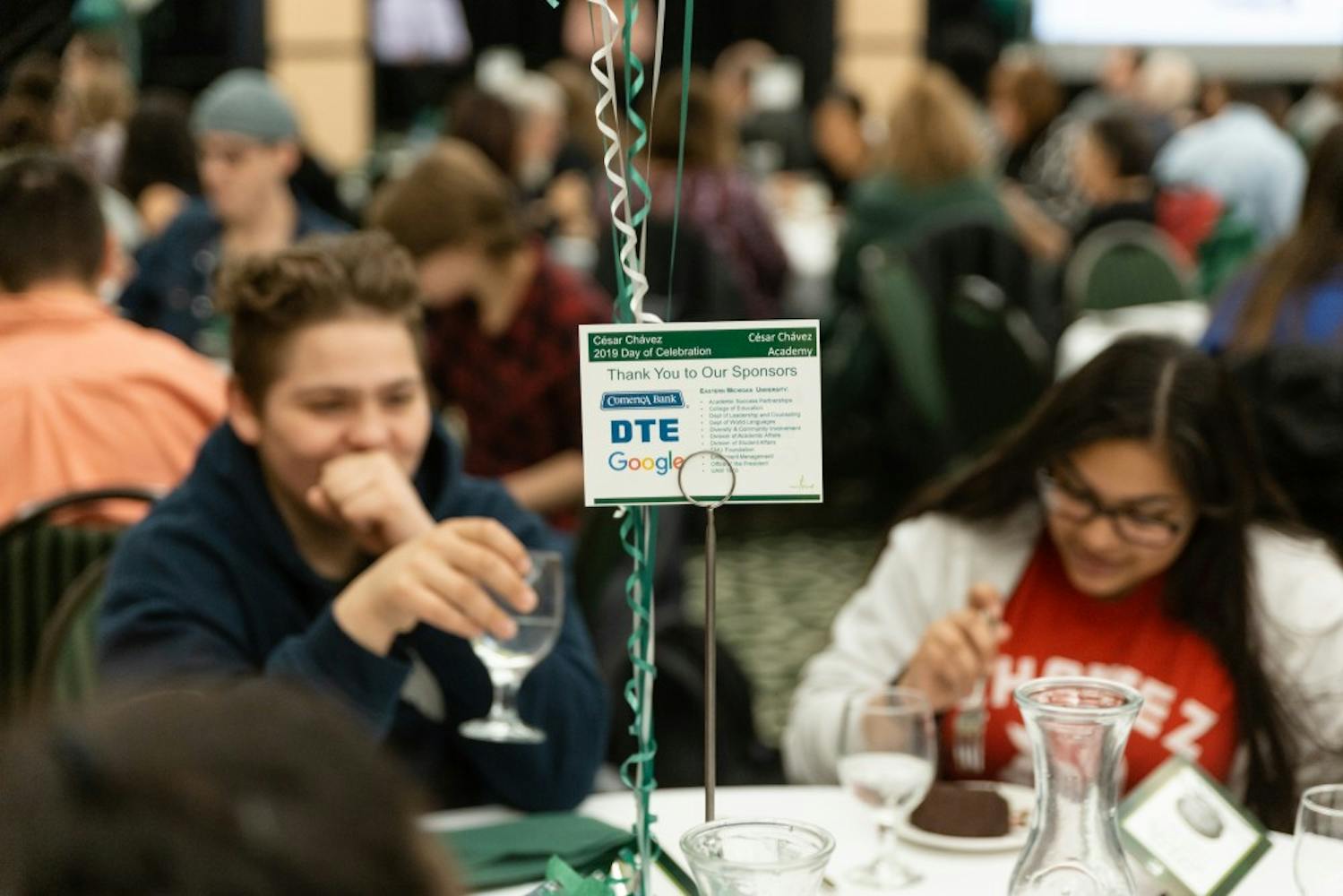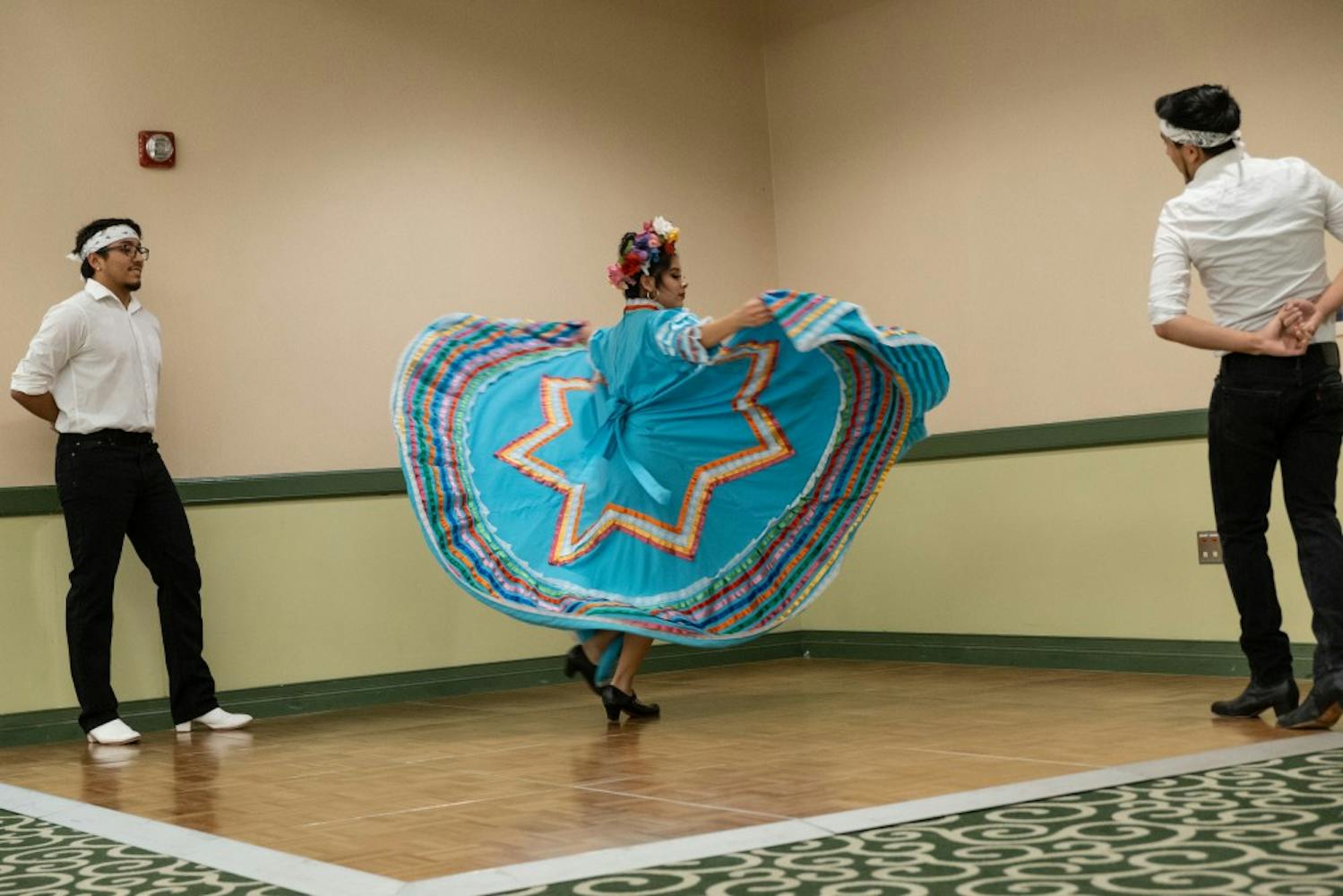Hundreds of students from several Detroit and Metro-Detroit high schools were invited to Eastern Michigan University for the 11th annual César Chávez Day of Celebration on Wednesday, March 20.
The event was organized and presented by the EMU Latinx Faculty and Staff Association (LFSA).
It was noted that 184 of the high school students in attendance are currently already admitted to EMU. The celebration served as an effective rallying cry for local Latinx students to persist in their pursuit of academic excellence and economic mobility.
“It looks pretty fun here,” Teresa Ceballos, a Hope of Detroit Academy sophomore, said about the campus. “When I walked in, it didn’t look like a college to me and I was comfortable.”
The day culminated in a luncheon and presentation held in the Student Center Ballroom where the students were joined by university faculty, staff and students. The banquet featured Latinx cuisine consisting of pork carnitas, tortillas, chorizo potatoes and seasoned rice. Soon after lunch was served, attendees were welcomed by EMU’s Latinx Student Association president Zereth Bustamante Léuvano and treasurer Armando Calvillo.
When asked what they knew about César Chávez, few students were able to provide any information. The event proved to be more of a celebration of what Chávez’s work means for Latinx-American students today and how his ideas can still be applied, rather than a commemoration of Chávez’s work itself.
The presentation featured keynote speaker Anita Ines Martínez, who serves as Executive Director of the Michigan Hispanic Collaborative (MIHC). This nonprofit organization is committed to providing Detroit and Metro-Detroit Latinx students with the skills and resources needed to overcome the educational and professional achievement gap.
Martínez delivered a moving narrative of her life as a student with immigrant relatives. She told the stories of three family members who have impacted her the most: her grandfather, her father and her mother. All three had endured difficult labor for low wages, worked tirelessly and selflessly to support their families and friends and were committed to providing their children with the best formal education experience possible.
“As a little girl, watching all three of these main characters in my life both prosper and struggle in business and life had a very profound impact on how I saw the world and how I knew I wanted to show up as an adult,” Martínez said. “I learned early on in life that we bring people along and we are stronger with a support system than without a support system.”
Her experience instilled in her a desire to support students living similar lives today.
First-year student Brooke Rapp is pursuing a minor in Spanish and was invited to the banquet by her Spanish professor. She felt that Martínez’s address gave her a better idea of what many Latinx-Americans experience as students in the U.S.
“It was really interesting to hear [Anita Martínez’s] story. . .” she said. “I feel like a lot of Latino and Latina people have similar backgrounds, so it was really cool to hear a specific story from her.”
Martínez went on to describe the unfortunate lack of economic mobility that the Hispanic community continues to face today. She pointed to five factors that she believed would contribute to a solution:
- Access to good community schools
- Strong housing stock
- Affordable access to good jobs
- Effective mentors
- Increase in college graduation rates within the Hispanic community
She emphasized this final point saying that holding a degree would serve as the key to accessing the middle class.
“The advocacy of César Chávez was not just about workers getting their basic needs met,” Martínez said. “It was economic and educational mobility way forward for those suffering in economic poverty and illiteracy.”
She noted that Hispanics are projected to represent 30 percent of the national population by 2050 and expressed that the sheer size of the community implies that they can have a massive impact on the national economy. Martínez concluded her speech by addressing the high school students present, calling on them to persevere in their educational careers despite the inevitable challenges.
“César Chávez’s civil rights movement is still alive today,” she said. “In this day and age, equity and economic disparity is as evident as it has ever been. Look at your education as a major driver for change.”
Her address was followed by a Spanish folklórico dance performed by professional dance troupe members Alicia Gonzales, Carlos Huemtes and Elijah Vasquez.
Several scholarships and awards were given during the night.
Dr. Raul Leon, Associate Professor of Higher Education and Student Affairs, went on to present the Trailblazer Award to Marcelo E. Marandino, who has served as a member of EMU’s LSFA for over 20 years. He was described by Leon as being “the glue to our family.”
The LFSA Student Scholarships were presented to LSA board member Alanah Morales and sophomore Ashley Rodriguez. The EMU Latino Alumni Scholarship was presented to EMU senior Estefania Alberto.
To learn more about the Annual César Chávez Day of Celebration, visit emich.edu/chavez.
















